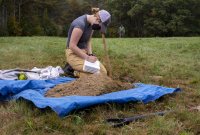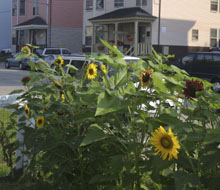
Getting the lead out tests urban gardeners
An environmental studies major at Bates with a concentration in environmental geology, senior Rachel Booty is researching soil contamination by heavy metals — primarily lead — for her thesis. In particular, she’s investigating the impact such contamination makes on urban living. Her research has involved testing plant and soil samples from the downtown gardens run by Lots to Gardens, the community garden program that Booty works for, and comparing them to control materials taken from test gardens on campus.
From the perspective of Lots to Gardens, lead contamination poses a peculiar dilemma, she says.
“To folks who are interested in having gardens right next to their apartments, which we’re really trying to promote, it’s hard to say, ‘We really want you to have a garden, but you can’t go digging in your soil,’ ” Booty explains. Fortunately, there are ways to ameliorate the contamination.
Lots to Gardens has built raised beds filled with clean soil and has planted crops, such as onions, that take up contaminants and can then be disposed of safely. Sunflowers and begonias have also proven helpful, as has adding large quantities of composted vegetable matter. (Another senior, Dana DiGiando of Jameston, R.I., is participating in an experiment in Portland using spinach to absorb lead from the soil.)
Bates has enabled Booty to take her background in working the land to a whole new plane. For her thesis project, she has worked with Assistant Professor of Geology Beverly Johnson and Assistant Professor of Chemistry Rachel Austin. “The two departments have just been fantastic,” she says.





